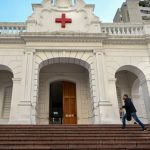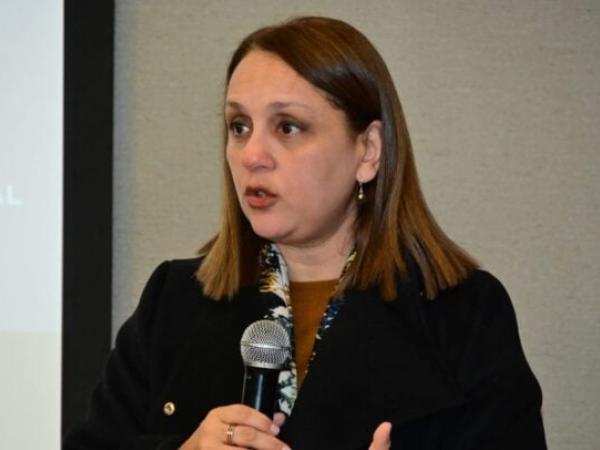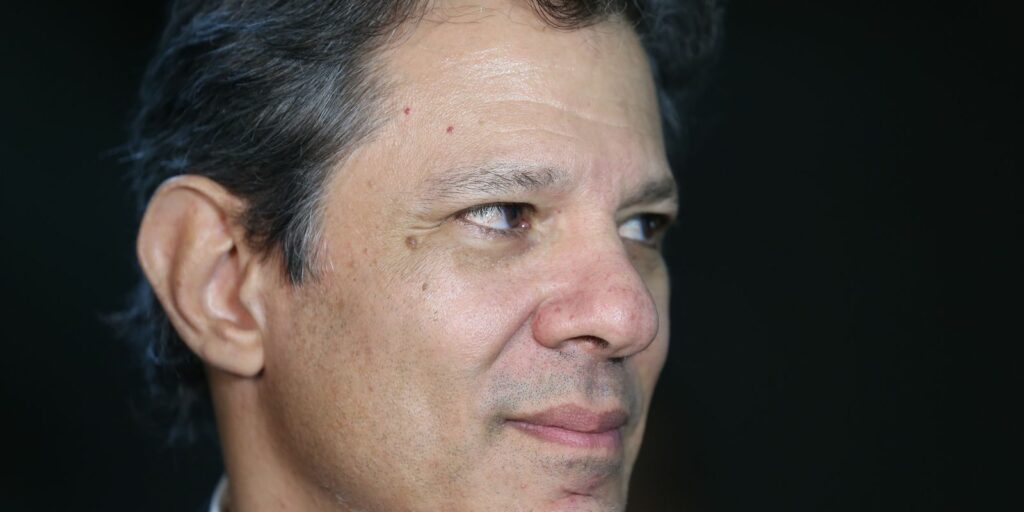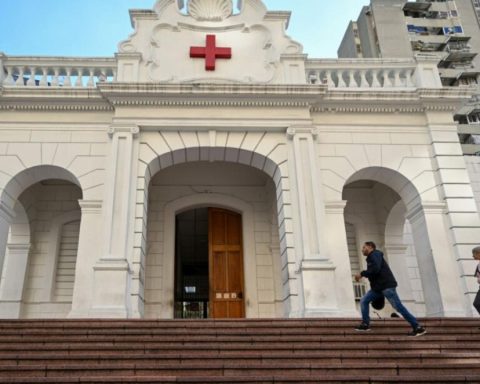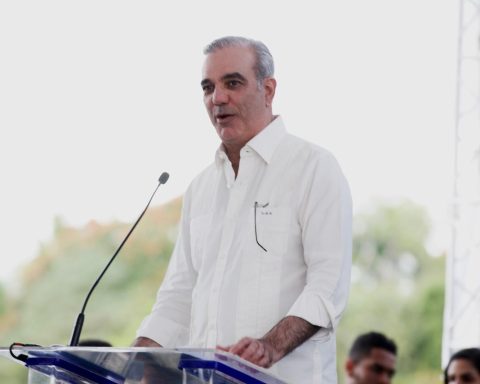Last Thursday, April 6, the same day that the non-commissioned officer (posthumous) Daniel Palma Yáñez died from a shot to his face, the National Prosecutor, Ángel Valencia, called an urgent meeting for the prosecutors of the Metropolitan Region. The head of the Public Ministry thus came out of the passivity – for some incomprehensible – in which he had remained throughout the national discussion about the security crisis. At the meeting, the persecutors agreed to request the precautionary measure of preventive detention for those foreigners who are arrested committing a crime and do not carry a national identity card.
This order was extended to regions through the Instructive National Prosecutor preventive detention (Official No. 298/2023). The document details that “in consideration of the growing problem that has been detected in relation to the identification of national and foreign defendants who commit crimes and who do not have an official Chilean document that allows them to prove their identity”, it was established “to all prosecutors of the Public Ministry to request the personal precautionary measure of preventive detention established in article 140 of the Criminal Procedure Code ”.
“The measure was supported by all the prosecutors, but there was concern about the different realities of the Civil Registry to enroll defendants without ID and also to respond to the requirements of the prosecutor’s offices. It is difficult to imagine that people deprived of their liberty are kept waiting for the procedures that can last weeks, ”says a source.
“A populist measure without legal support,” says another lawyer. “Valencia stayed out of the discussion due to the security crisis. He did not say anything about the new Naín-Retamal Law. Many of us expected his pronouncement, because this could throw the investigations of the High Commands, for example. It is as if the defenses of the police were behind this law… Defenses that have attacked prosecutors, who have sued. When there is a new law, it is worth more than others when it benefits the defendant. You can request a review of the sentence. That is the complexity of the new law. And the National Prosecutor did not provide a line there ”, adds the criminal lawyer.
The truth, others note, is that the measure, more than an innovation in crime control, is a criterion set by the National Prosecutor for deputy prosecutors, in terms of requesting preventive detention and that, if it is not granted by the judge of Guarantee, appeal to the Court of Appeals. “Something that is obvious to many, that of requesting a precautionary measure to restrict the freedom of undocumented immigrants who commit crimes, was not being done. That is precisely what Valencia is doing: setting the criteria,” points out another lawyer.
This was exactly what happened in the case of a Venezuelan in Maipú who ran over a police officer. Since there were no witnesses other than the uniformed policeman himself, the defendant was released by the Guarantee judge, but the resolution was reversed after appealing to the Court, whose ministers unanimously left the subject in pretrial detention.
This was announced by the Prosecutor’s Office in a tweet: “Attempt to run over a police officer in Maipú becomes the first case of the ‘Valencia criterion’ accepted by the Santiago Court of Appeals: unanimous ruling leaves a subject without a provisional RUT and with an apparently tampered Venezuelan ID in pretrial detention for danger of flight.”
The Valencia criterion, however, is not shared by the entire justice system, which is why there are already signs of difficulty in its application. Indeed, during the same day on Tuesday, a judge from Concepción did not accept the request to leave four foreigners in preventive detention, detained for the crime of reception. Although the defendants did not have a national provisional RUT, they did have a passport and DNI from their country of origin. For this reason, the magistrate dismissed the arguments of the Prosecutor’s Office and granted them their freedom, with less burdensome precautionary measures.
The passage of the dreaded 81 K
Last Monday, March 27, there was a day of maximum tension in the National Prosecutor’s Office. The Council of Prosecutors met early and at mid-morning they began to call officials from Human Resources. “This decision is always made in conjunction with the headquarters. This year nobody knew anything – not even the bosses – and, for the same reason, many people thought that they could be on the list of dismissed. The atmosphere was very anguished”, says an official.
Around 11:00 a.m. they began to summon those who would be dismissed.
According to the Organic Law of the Public Ministry, once a year, generally in March, the National Prosecutor informs the General Council of Prosecutors of the names of the officials who will be dismissed by article 81 K. A simile to “company needs ” that operates in the private sector. But here it is called: needs of the National or Regional Prosecutor’s Office (rationalization or modernization, change in the nature of functions…). This year there were about 30 people, 16 from the National Prosecutor’s Office.
Thus ended several weeks of rumors and fears. However, the uncertainty worries those who continue to work in the Prosecutor’s Office. “No one knows where things are going. It is true that everything continues to work because there are people who have been there for a long time and the work is done almost automatically, but the bosses themselves look at each other and ask what they want, because the Prosecutor does not give many instructions,” says one administrative.
But the installation of Valencia has just begun, who preferred to wait for the passage of the 81 K to “make a natural selection” and find out who will count on starting this month. And add those who already had files.
Valencia map
On January 6, the Council of Prosecutors approved the proposal to restructure the specialized units of the Public Ministry. Thus, the departments that support the work of criminal prosecution went from five to seven. And to get them going, the current National Prosecutor recruited professionals from different institutions and changed others from unit.
An example of this is Eugenio Campos, former Regional Prosecutor of Magallanes, in charge of the investigation called “Verde Austral”, which implied an embezzlement of more than 28 billion pesos within the Carabineros and which involves former High Command and officers of that institution, as well as civilians. He was appointed by Valencia in the direction of the Specialized Unit in Anti-Corruption, Violation of Probity and Associated Money Laundering (part of the position held by Marta Herrera). Campos was the Regional Prosecutor closest to Abbott and under his gaze will be issues such as the investigations in the municipalities of Vitacura and lo Barnechea, to name a few. In the same line –a former Abbott– is the Central North Metropolitan Regional Prosecutor, Xavier Armendáriz, who maintains his designation as deputy National Prosecutor –he was also Abbott’s–, although in this case, they say, there is not so much closeness. “Rather, Armendáriz seems to prevail over Valencia,” they commented in the Public Ministry.
Inside the Prosecutor’s Office they maintain that in the first 100 days Valencia has ceded leadership to the prosecutor Xavier Armendáriz and that, among various other reasons, Armendáriz’s delay in the formalization of the former mayor of Vitacura, Raúl Torrealba, would be increasing the tension between them .
Whoever was Jorge Abbott’s chief of staff, Alejandra Seguel, was initially assisting Valencia in that same position, but later took over as head of Human Rights, a unit that was divided into three: Adolescent Criminal Responsibility, in charge of Alejandra Mera González-Ballesteros, who worked as an academic and researcher at the Diego Portales University; Gender, still vacant (although it is said that the former Ombudsman for Children, Patricia Muñoz, will arrive); and Human Rights. It is in the latter where there are important cases related to violations of human rights during the social outbreak, with complaints against politicians and Carabineros. Mauricio Fernández, who heads the Economic Crimes Unit, was ratified in his position. Also the director of the Planning Unit, Mónica Naranjo, and the Manager of the Administration and Finance Division, Sandra Díaz Salazar.
A few months ago, Marcos Pastén joined, who was head of the Legal Advice Unit of the South Metropolitan Regional Prosecutor’s Office and right-hand man of the then prosecutor Raúl Guzmán Uribe (today Guzmán is the secretary of the Senate and was key in promoting Valencia’s campaign against The congress). They say that Pastén arrived as a legal adviser because Valencia did not trust anyone and little by little he was gaining space and today he is head of the Legal Unit, which will be over various divisions, including a group of lawyers who will liaise with the Prosecutor’s Offices. Regional. What is not at all happy for the Regional Prosecutors, who assume that there will be a communication barrier with Valencia.
With regard to regions, as in charge of the causes of false financial identities that offer loans online, he appointed the Regional Prosecutor of O’Higgins, Emiliano Arias.
The lawyer Ignacio Castillo Val also arrived, another man of Raúl Guzmán and who served as executive secretary of the Resolution Council for Parliamentary Appropriations in Congress, and today heads the new Organized Crime Unit. From Paz Ciudadana, Ana María Morales Peillard arrives at the Studies Division. As Human Resources manager, Christian Hansen Cruz was appointed, who has worked in the Civil Service Directorate, SII and IPS. The new IT manager, Marcelo Gómez Concha, arrives from the North Central Prosecutor’s Office. Catalina Wildner Zambra, a lawyer from the Universidad de Los Andes, was left as chief of staff. As head of the Specialized Unit for Sexual Crimes, Maurizio Sovino, who was the deputy director of the same Unit and was promoted. And in the strongest position, for being the right hand of the National Prosecutor, the civil engineer Ximena Rivas Asenjo, former national director of the National Disability Service (Senadis) during the last Government of Sebastián Piñera, will assume as national executive director.
According to sources close to the Public Ministry, until now Ángel Valencia’s circle of influence would be made up of Marcos Pastén, Mónica Naranjo, Ana María Morales, Sandra Díaz and Alejandra Seguel.
In this way, the gear of the National Prosecutor’s Office begins to move in the Valencia era, who still weighs heavily within the Public Ministry for having arrived from private practice. Not just for the causes that led, but also because “it would be remodeling the Prosecutor’s Office as if it were a law firm, which includes ‘account executives to serve the regions,'” they complain from both the province and Santiago.








